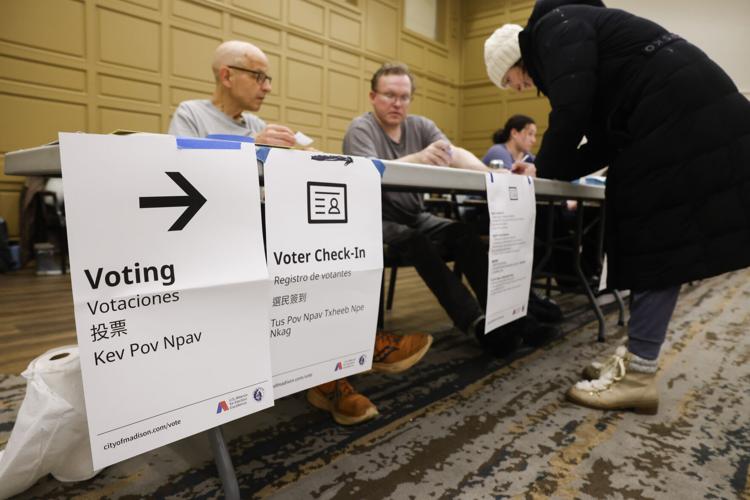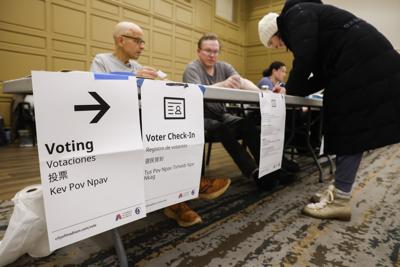Wisconsin voters approved Tuesday a pair of constitutional amendments that would ban the use of private funding to administer elections and limit who can be involved in the voting process.
Proponents argue they are a needed step to prevent impropriety, but critics say the changes leave them with more questions than answers.
Municipal clerks say it is uncertain how the amendments might affect the use of volunteers and other personnel who help with the task of running local elections. And they worry state lawmakers won't set aside money to help ensure they can buy needed equipment.
The second of the two amendments included language that only officially designated election and poll workers “perform tasks in the conduct of primaries, elections, and referendums.” Some have called the wording overly vague, potentially leaving it up to the courts to decide which activities it includes.
Both measures come as a response to Wisconsin's 2020 elections, when hundreds of municipalities received private grants from the Center for Tech and Civic Life, backed by Facebook founder Mark Zuckerberg and his wife, to help administer elections amid the COVID-19 pandemic.
The most high-profile targets of Republican anger were grants accepted by five of the state’s largest municipalities in Milwaukee, Madison, Kenosha, Racine and Green Bay. Those local governments ultimately received nearly $9 million in grants.
Conservatives argue that money was used to boost turnout in largely liberal areas, a criticism local election officials rejected.
Legislative efforts to block the use of private funds have been common in other states, but Gov. Tony Evers vetoed a proposed ban in Wisconsin, prompting Republican legislators to push for the two amendments.
The Associated Press projected that both amendments would pass a little before 9 p.m. A few counties, most notably Dane County, were voting to defeat the amendment but both measures carried a comfortable margin of support at press time.
In a statement Tuesday night, Republican Party of Wisconsin chair Brian Schimming cheered the results, saying voters "secured our elections from dark money donors."
“I think for the average voter, these things do seem like common sense, right?” said Will Flanders, research director for the Wisconsin Institute for Law & Liberty, or WILL, a conservative legal group that advocated for the amendments. “We don't want private entities funding elections. We don't want those that aren't election administrators involved in election administration.”
Related: How voters will drive the Cap Times election coverage
Ban creates budget worries
As soon as the April 2 election is certified, which typically occurs a few weeks after election night, the amendments will officially become part of the Wisconsin Constitution.
Madison officials have already spent $1.5 million in Center for Tech and Civic Life money they received in 2023 and 2024, purchasing equipment that will arrive later this year.
Local officials worried the amendment would be enacted without a corresponding increase in state funding for elections, and as a result cities might have to scale back the number of polling places or continue using outdated equipment.
Diane Coenen, clerk for the City of Oconomowoc, noted that cost concerns exist for smaller municipalities, as well, which might not have the spare change to buy new big-ticket items.
“They can't necessarily afford the same election equipment or materials that someone (in a city) my size can afford,” she said.
The state provided an increase in aid to local governments, something called shared revenue, in a historic 2023 deal. But the way the funding bump was structured didn’t help some local governments, such as Madison, which is facing a budget shortfall.
Flanders acknowledged that a conversation around increased state funding for elections is worthwhile but said that wasn’t a good enough reason for voters to reject the amendments.
“We think the cure can't be worse than the disease,” he said.
Clerks fear they'll lose helpers
Clerks worry that the second amendment approved April 2 could make elections even harder to administer in Wisconsin.
The language of this amendment also stems from 2020, when Republicans were critical of Green Bay’s decision to hire an outside contractor they believe trampled on the work of the city clerk.
State statutes already say that only election officials lawfully appointed or elected to serve “may conduct an election.” Generally speaking, election officials must be a resident of the county in which they are selected to serve.
Coenen said it is unclear how the constitutional amendment language, which she says clerks were not consulted on, would affect their operations.
Plenty of people who are not sworn election officials are involved in election administration, even if they are not counting the votes. IT staff or representatives from companies that make voting machines might be called on to troubleshoot, and volunteers might need to handle administrative tasks.
Debra Cronmiller, director of the League of Women Voters of Wisconsin, noted that her group will give people rides to the polls, help local clerks recruit poll workers or register people to vote. It is now unclear, she said, whether those tasks fall into the category of helping with “the conduct” of elections.
“There's a lot of support players involved with running elections,” Cronmiller said. “Our clerks are going to be overly burdened going forward, because the support players are no longer available to them.”
Currently, Coenen said, clerks have the flexibility to “use common sense” in determining what crosses the line. She noted that, in Oconomowoc, she will use volunteers to help set up polling locations before Election Day.
Smaller towns might need even more outside help, she said, because the local clerk might be the only full-time, sworn election official.
“I think it would potentially tie some municipalities' hands,” Coenen said.
Coenen and Cronmiller both floated the possibility of lawsuits over what conduct would now be allowed under the Constitution.

Voters walk through wet, heavy snow as they leave the polling place April 2 at Capital Lakes in Madison.
Election-related litigation is far from unusual in Wisconsin, an electoral battleground, and clerks have become accustomed in recent years to changing policies due to a judge’s order.
But the looming November election, and the August partisan primary that tees it up, are not far off, meaning that any clarity would have to come quickly. Coenen said she would like legislation to ouline more specifics, although lawmakers are not planning to return to the Capitol to consider any more legislation in 2024.
The Wisconsin Elections Commission could also conceivably issue guidance for clerks. Commission Chair Don Millis said he was effectively “a casual observer” on the amendments, with the commissioners juggling a number of other election-related topics, but he noted they would step in if needed to help clarify the amendments.
He said he's unsure of what might happen for contractors and other personnel if the amendment passes.
“I would anticipate we’re going to have to address it somewhere,” Millis said.
Flanders, of WILL, said the intent was to “close the loophole” that allowed Green Bay to bring in an outside consultant in 2020 and that other, common election-related activities would remain allowed.
“While there might be some things on the margins that have to be litigated in court, we think this will hold up and the boundaries will be clear,” he said. “And we won't see things like, you know, poll workers, the League of Women Voters, for example, being banned from participating in the process as they do now.”
More amendments on the ballot
The constitutional amendments approved Tuesday will not be the last ones going before voters this year.
In August, residents will be asked whether they want to require the Legislature to handle all federal money distributed to the state, a response to COVID-19 aid from Washington being handled by Gov. Evers’ administration.
Another elections-related amendment will await voters in November. This time, the question will be clarifying that only U.S. citizens can vote in local elections. While there has been no push to allow this practice in the Badger State, local governments in California, Maryland and Vermont have allowed non-citizens to cast ballots for municipal races.
Observers have argued the amendments are a natural consequence of Evers’ veto pen becoming a constant thorn in the side of the GOP-controlled Legislature.
“To some extent, this is just a product of divided governments,” Flanders said. “People seek out alternative pathways to get policies into law. But hopefully, as we move forward, there'll be a greater incentive on the part of both the governor and the Legislature to work together and maybe this will sort of be a temporary thing.”
But Cronmiller wondered if voters would ultimately get fatigued and she worried that unintended consequences could require lawmakers to come back later and ask the public to undo the amendments.
“The Constitution was set up pretty fairly right from the get go,” she said. “And trying to make it better doesn't always result in that.”
This story has been updated to reflect that Madison used $1.5 million in Center for Tech and Civic Life grant money to purchase election equipment.







